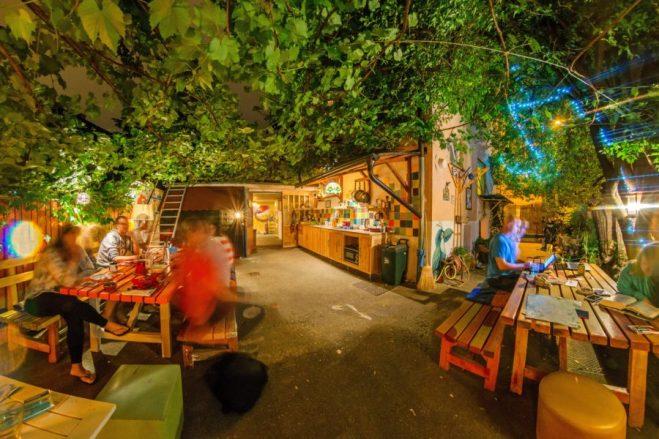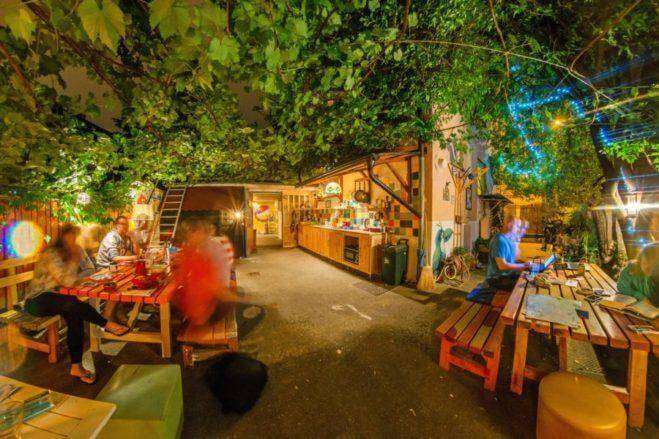
Today we’re bringing you something a little different: An interview with Igor, the owner of the Mali Mrak community hostel in Zagreb, Croatia.
It’s one of the most special hostels I’ve ever stayed at. In fact, I can probably only think of five or six really substantial hostels that left this magical impression on me. And Mali Mrak is right up on that list.
Listen to the full pod here:
He really has some interesting insights on hostel dynamics and evolving backpacking trends. Here are some highlights:
On maintaining the energy and charm of his community hostel over the course of 12 years:
It comes naturally to me because it’s simply a continuation of the lifestyle I had prior: Being a student in Zagreb, moving around, always bouncing around people and places.
Now, that lifestyle has extended to this house. It’s easy to avoid burnout when running the hostel is more of a lifestyle than a job.
Also – It probably helps that I hadn’t actually stayed in many hostels prior to opening this. I had no fixed pre-print so I could do it entirely my way… And it worked!
On Zagreb as a travel destination:
The layout is really nice; you have lots of green space and small neighborhoods to explore. That’s the biggest advantage: Despite being relatively small, Zagreb has lots to discover and lots of chances to do so beyond the tourist hotbeds.
One thing I will mention about Croatia in general: The way of life is slower here. So you have a Western European-looking city running on the Balkan mentality.
On his advice to visitors looking to explore the city:
I ask a counter-question: What do you like to do when you explore a city?
The reason I ask – it’s easy to provide a tourist template. Here’s attraction X, Y, and Z; take your photos and good luck. But that’s where travel burnout comes from, right? Following that same familiar template.
And thankfully, Zagreb has many opportunities to go beyond the quintessential tourist template.
On the evolution of backpacking over time:
About a decade ago, things were definitely a bit less certain. But that uncertainty has been lost.
The charm of randomness has been lost.
Before smartphones, traveling was more spontaneous – the hostel would get 30 to 40 walk-ins a week. Now, lots of people are more careful and more fearful, even to the point of feeling programmed and robotic.
From a human standpoint, it’s certainly disappointing. The best stories and experiences and friendships always arise from spontaneity.
From a business standpoint, yeah it’s pretty great. You get more certainty of bookings ahead of time; no unpleasant surprises. But you definitely lose a bit of that travel charm.
On creating a unique social environment that naturally promotes community:
It happened organically. If you can set up a pleasant atmosphere for people to meet organically, they’ll start chatting and it’ll take off.
All we really did was just put two big tables in the garden – now you have a setting where people have to sit with someone else.
But you know I’m adamant about having no pre-planned events. Because you never know who will be at the hostel or what the group vibe will be. And you don’t want to program the chemistry of people.
People who want to meet and spend time together always will; we don’t manufacture it.
On how the hostel atmosphere changes in the winter:
Fewer people! Croatia is a summer country, but in the winter we get this special energy of mostly long-term travelers.
There’s a special charm to having a smaller crew in the house. We have many more communal activities – cooking, watching movies, playing role-playing games. Much more of a spontaneous, free-flowing community.
On finding this type of special community hostel out in the world:
I’d suggest looking at how personalized the reviews are. Some people leave us essays, praising the hostel for being the highlight of their trip! You’re not getting that at the copy-and-paste IKEA-vibe hostels.
Another angle: Check if the owner’s name is mentioned in the reviews. Community hostels often need an integrated owner who views it as a passion project, not just a business.
On the growing trend of digital nomadism:
It’s absolutely a trend I’ve noticed. Eli, you were actually the first digital nomad who came here! In a way, you opened a gate, and now it’s a tangible movement with all sorts of different nomads.
Not a bad thing though – oftentimes digital nomads are the best guests. Typically quite self-sustaining, pragmatic, and very respectful.
From my experience, their bringing work into a travel environment hasn’t really detracted from the atmosphere. It all depends on the person and how they engage with the community.
On managing the loneliness of travel and digital work:
It’s tough. There’s no recipe for connection. I’d just suggest trying to balance the periods of running solo and in a group.
And also – look for these types of special communities, because they’re out there. It can be hard, but when you do find them, it’s very worth it.
There you have it! For more on Igor, his incredible community hostel Mali Mrak, backpacking movements, and Zagreb, check out our full conversation above.
If you have any thoughts or questions, post a comment below. We’ll be sure to reply asap!



0 Comments